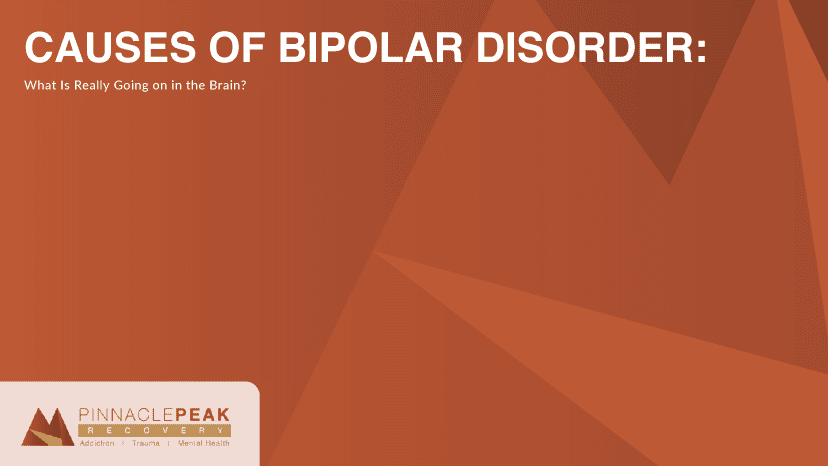It is never easy hearing a new diagnosis for a mental health condition, with bipolar disorder being no different. So many thoughts swim through your mind. How did I get this condition? What causes bipolar disorder in the first place? Will my life be different now that I know this?
You are not alone in your feelings. Over 10 million people in the United States are currently diagnosed with bipolar disorder. At Pinnacle Peak, our team is composed of mental health experts, well-versed in treating bipolar disorder and co-occurring substance use disorders. Let’s talk about the causes of bipolar disorder, where they stem from, and strategies you can implement to help.
The Roots of Bipolar Disorder: Uncovering the Causes
Bipolar disorder is a type of mood disorder that affects emotions through different cycles. It is a mental health condition that is life-long but is completely manageable through treatment options. The root causes of bipolar disorder are not fully understood, though there are certain pinpointed areas that have been shown to be pieces to the puzzle.
Bipolar Disorder: The Genetic Link
Research is always looking for specific genes that are linked to the development of bipolar disorder, but none have been completely concrete. The general consensus is that if an immediate family member is diagnosed with bipolar disorder, you are more likely to develop it yourself.
One study conducted compared almost 42,000 participants with bipolar disorder to 371,000 without. Using a genome-wide association study (GWAS), the results showed 64 total genomic locations that were associated with bipolar disorder. Of these, 33 were previously unreported. These were found to be associated with immune function and other psychiatric disorders, and suggest biological pathways that could be involved in bipolar disorder. There were notable genetic overlaps between bipolar disorder and traits such as alcohol use, smoking, and sleep disturbances.
A distinction was found between bipolar I disorder, which showed stronger genetic links to schizophrenia, and bipolar II disorder, which was more closely related to depression. The study highlighted 15 genes with strong evidence of causative roles and identified drug-target genes potentially useful for new treatments for bipolar disorder. This shows the need for continued gene studies to further understand how they correlate with developing bipolar disorder.
Connections of Bipolar Disorder and Brain Structure
One cause of bipolar disorder is changes in brain structure and functioning, though there is no specific science behind this yet. Studies have shown that bipolar disorder affects three areas of cognition extensively: attention, executive function, and emotional processing. These results were found by administering cognitive functioning tests to participants with bipolar disorder.
The study also compared brain imaging to see if these results can be seen physically. In bipolar disorder, structural abnormalities in the brain’s prefrontal cortex have been confirmed through postmortem studies and structural MRI. Those with bipolar disorder who have a family history of mood disorders showed a reduced volume in the subgenual region of the anterior cingulate cortex. Imaging performed during mania showed a change in blood flow in the brain, but was not able to be accurately measured. This is due to the person being at rest during the test, not actively experiencing mania symptoms.
Life’s Triggers: External Factors That Spark Bipolar Disorder Episodes
One of the biggest causes of experiencing a bipolar disorder episode is triggers. Bipolar disorder creates cycles that affect mood, changing between mania (or hypomania), depression, and a state of “normal.” Coming in contact with a trigger can set off an episode that can last for days, weeks, or even months. Understanding your triggers is crucial in managing your bipolar disorder to prevent cycles from becoming intense. Common triggers involve emotions and physical responses. Let’s explore these further.
Mood Swings Unveiled: Emotional Triggers Behind Bipolar Disorder Flare-Ups
Bipolar disorder directly interferes with mood and emotions. One of the biggest triggers for either a depressive or manic episode flare is stress. Though the brain has a natural response to stress, those with bipolar disorder can experience it differently. Times of stress result in the person feeling like they need to accomplish everything all at once – leading to a manic episode. Others respond to stress by becoming overwhelmed and shutting down – resulting in a depressive episode. The stress response can also change depending on the circumstance.
Examples of times when stress can be a risk for triggering a bipolar disorder episode include:
- Losing a job or steady source of income
- Experiencing a form of abuse (physical, sexual, emotional, etc.)
- Losing a family member or close friend
- Going through a breakup or divorce
- Having to move with or without warning
If experiencing one of these events leads to a bipolar disorder flare, it is okay, and does not mean you have failed. Talk with your care team moving forward on coping techniques to keep your stress in check and your mind at ease.
Body Signals: How Physical Triggers Influence Bipolar Disorder Episodes
The body can react to triggers before the mind even realizes it. In the case of bipolar disorder, many different physical influences can trigger the cycling of episodes.
Certain medical conditions have been linked to causing bipolar disorder episodes. These include brain injury, stroke, multiple sclerosis, and many autoimmune conditions. This is why it is important for doctors to perform physical exams when determining if you have bipolar disorder and why.
Another trigger involves using substances and/or alcohol. Taking substances alters the brain’s chemistry and can trigger a bipolar disorder episode. It is important to note that during manic episodes, psychosis can occur. The person experiences hallucinations and delusions, losing touch with reality. Taking substances exacerbates this condition and can lead to dangerous outcomes. Psychosis is a medical emergency and requires immediate professional attention.
Though antidepressants have been utilized in the treatment of bipolar disorder, in some cases, they may trigger manic episodes. It is key to always communicate with your doctor if this happens. They will work with you to find what combination of medication is right for you to help prevent inducing mania.
Navigating Coping Strategies for Bipolar Disorder
Coping strategies for bipolar disorder can be the game-changer in living with the condition comfortably. They are not difficult to navigate, and anyone can implement them into their daily routines.
- Create a daily routine: Having a routine you follow each day can help alleviate stress and prepare you for what is ahead. Setting meal times, having a hygiene routine, and prepping for the next day’s needs can help with stability and reduce mood swings.
- Get enough sleep: Mood is linked directly to sleep. Making sure you get enough each night will help keep your mood level.
- Keep track of mood changes: When you notice an episode may be on the horizon, document how you are feeling. By tracking your mood, you will see patterns and be able to pinpoint triggers, helping you learn what is causing the shifts in mood.
- Maintain your treatment plan: It is important to keep attending appointments, taking your medications as prescribed, and continue moving forward in your treatment plan. Consistency is key with bipolar disorder, and maintaining your treatment plan will only keep helping you in the future.
- Practice meditation techniques: Utilizing grounding techniques such as the 3-3-3 method will be helpful during times of stress. To perform this method, name 3 things around you, listen to 3 sounds, and move 3 body parts. This brings you back into the moment and helps lessen stress.
Getting Help for Bipolar Disorder in Scottsdale, AZ
The causes of bipolar disorder can be frustrating as there is no simple one-word answer to the question. However, seeking bipolar disorder treatment can help bridge the gaps and give you the understanding you are looking for.
Through guided therapies and coping skill development, you will learn how to manage your bipolar disorder in a way specific to you. Your needs and goals are important, and your care team will be there every step of the way. Seeking mental health care can feel scary and overwhelming. It is difficult to start something new, but taking that first step will show you just how great life can be when bipolar disorder is in check. There is no wrong time to begin – it’s time to walk through the door.
If you or someone you love is living with bipolar disorder and looking for support, Pinnacle Peak has you covered. Our team utilizes evidence-based practices along with holistic approaches for a well-rounded, full-spectrum program. Call us today at 866-377-4761 to learn more about our program offerings.
Clinical Excellence | Compassionate Care | Family Feel



